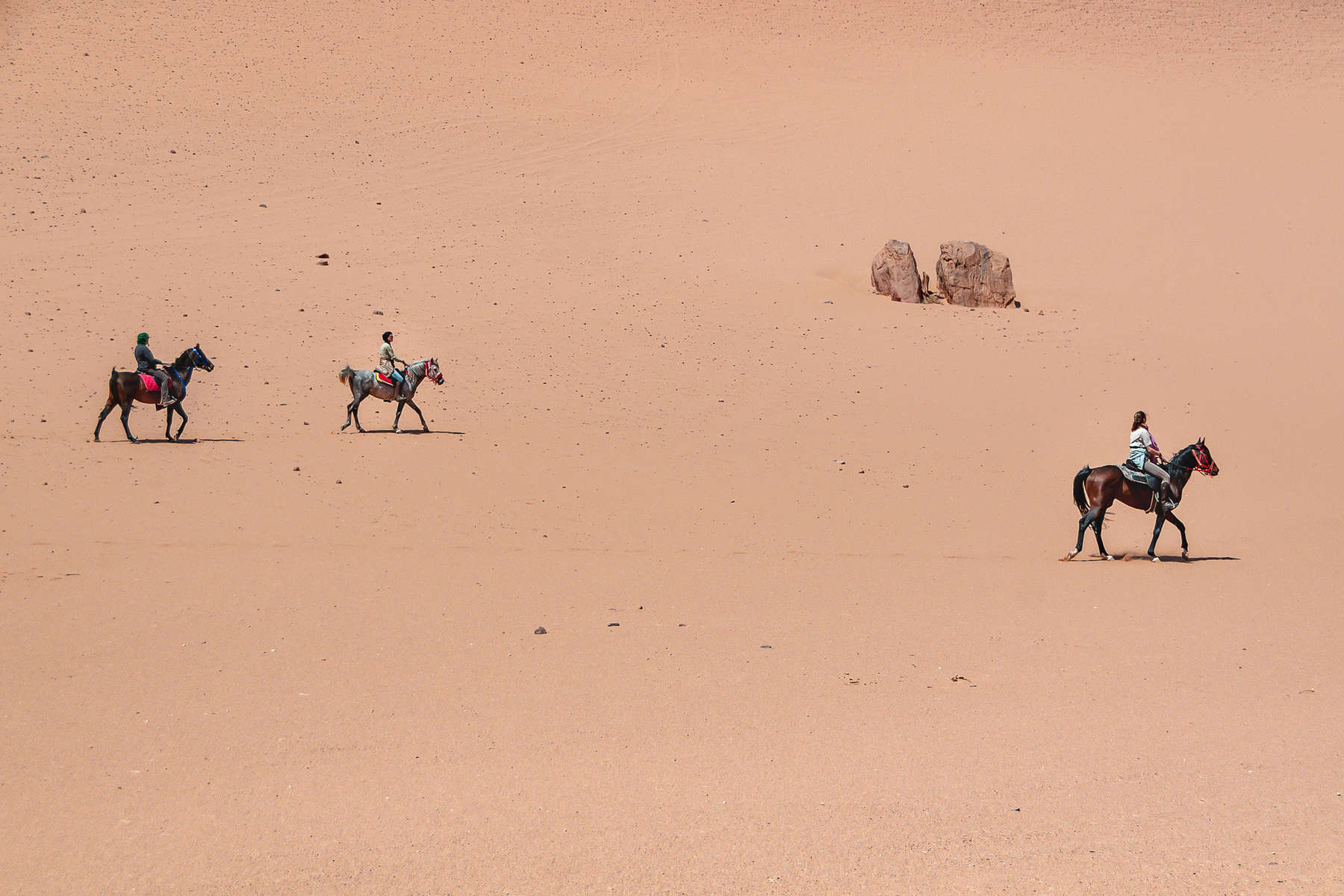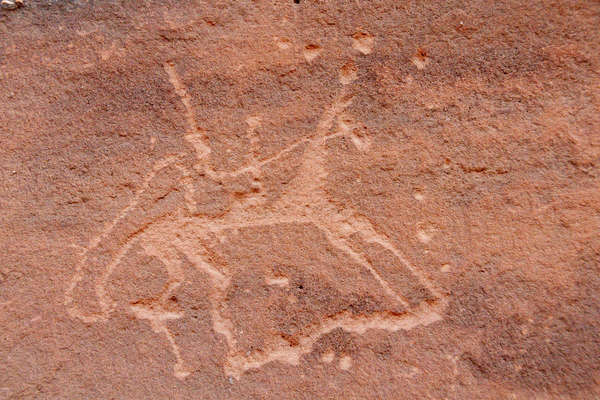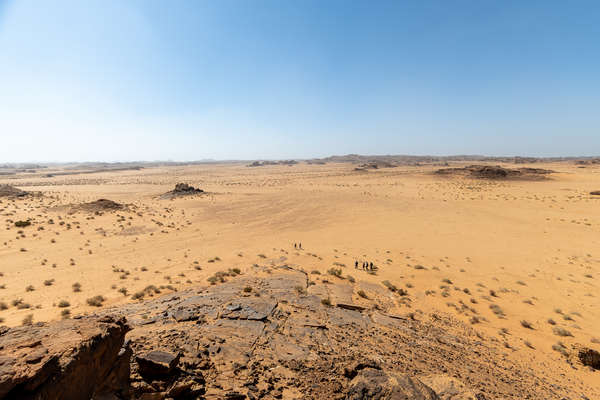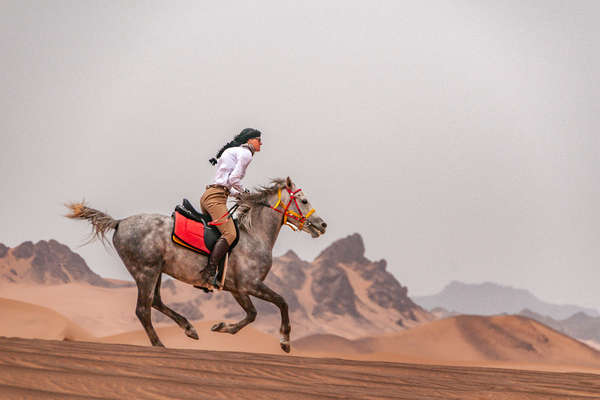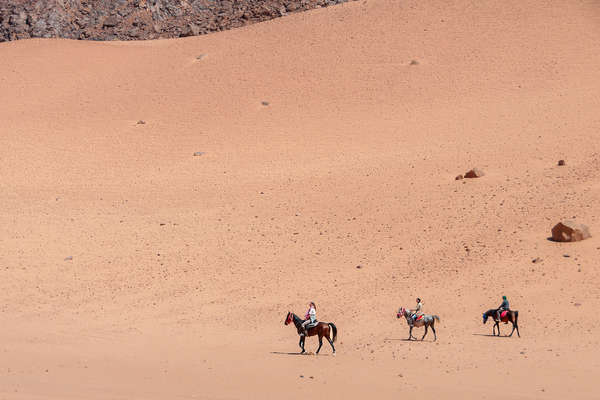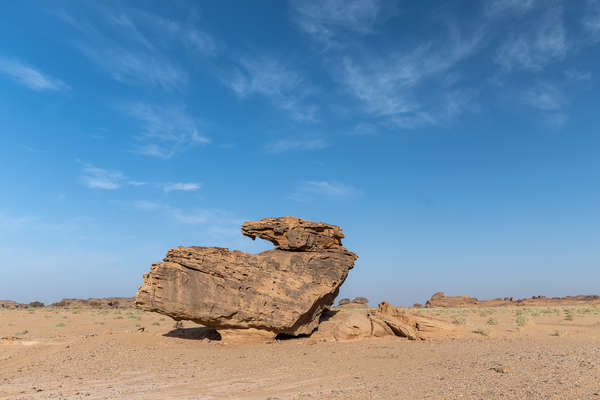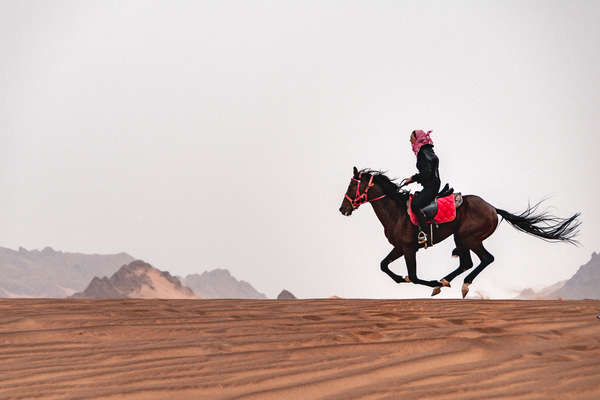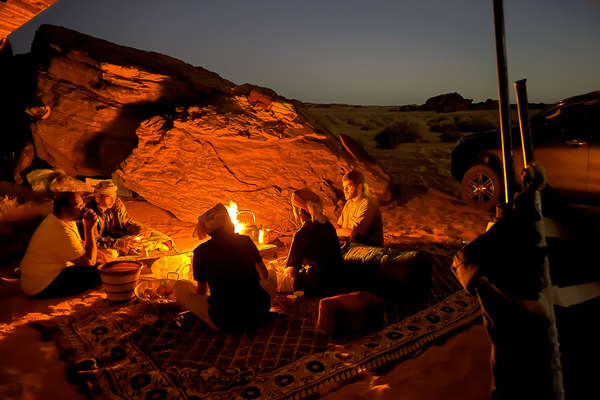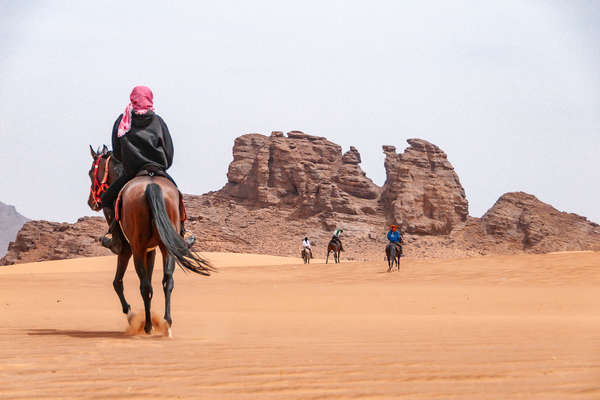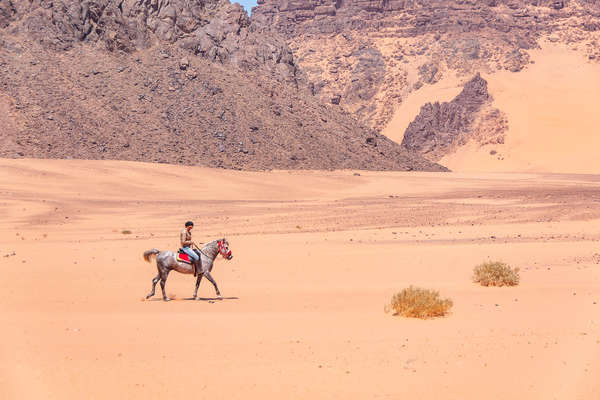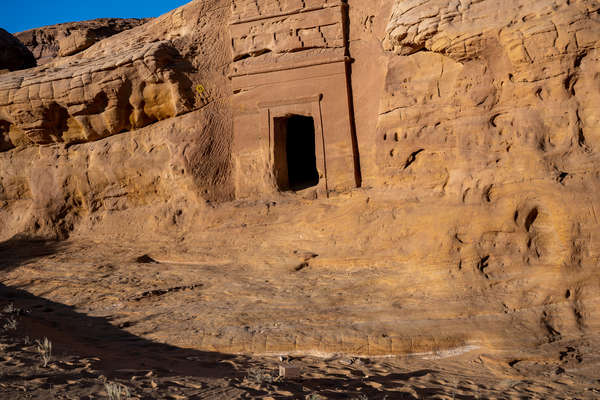Comfort
- In Medina: a simple three-star hotel (local standards), double or twin en-suite rooms and WiFi available.
- In Al-'Ula: simple desert inn or fully equipped campsite (large tents, shared showers and toilets).
- In the desert: desert camp. We three-person tents for two guests sharing. Mattresses are provided but please make sure to bring your own sleeping bag. There is a mess tent for the group. No toilets (see "hygiene" below).
NB: Tents are set up and and taken down by our local team, and you are not expected to contribute to camp chores.
Hygiene at camp
For those nights spent in tents, it is possible to wash with very little water - please remember that water is a rare resource in Saudi Arabia. If possible, bring a small basin, a natural sponge and biodegradable soap. Water will be provided by our local team (maximum 3 liters per person/day).
It's common practice to use baby wipes, but under no circumstances should they be thrown away. Garbage cans will provided by the team for this purpose.
During the day, it is best to burn toilet paper to leave no rubbish behind (remember to bring a lighter).
Meals
- Out of town: meals in a local restaurant (picnics at lunchtime on some riding days); breakfast and evening meals at your accommodation or in a local restaurant to discover Saudi specialities.
- In the desert: breakfast, lunch and dinner prepared by the cook(s). Copious and varied, they are made from local ingredient (meat bought in local villages); lunch is normally a hearty picnic or a cold meal.
For breakfast: unleavened Arabic bread called khobz, jam, tea, coffee, spreadable cheese, hummus, hard-boiled eggs, a mixture of spices, sesame and thyme (speciality called zaatar), omelette.
Lunch/picnic: salad, hummus, vegetables (cucumbers, tomatoes, peppers, onions), tuna, hard-boiled egg, cheese (spreadable), bread, cookies, apples, oranges, juice. On some days, your guide can cook traditional dishes during the break.
For dinner: soup or hot meal with meat, rice or potatoes and simmered seasonal vegetables. The evening meal is also an opportunity to sample typical Saudi dishes.
Drinks: hot drinks are provided during the ride (tea, coffee). Water is delivered by our local teams directly to the camp site in large returnable bottles of mineral water, so you can fill your water bottles as much as you like every day (it is nevertheless imperative to bring your own water bottle).
Climate
The best time to travel is from October to March
October and November are an excellent time to ride in Al Ula: the weather is generally fine and temperatures mild, cooling off as the weeks go by.
December and January: cooler, temperatures remain pleasant during the day, but the nights are cold. Showers are possible.
February and March: the temperature begins to ease, the days are pleasant, but the nights can be cool.
Tips
It's customary to tip local teams. You can expect to pay around €50/€70 on average for the whole team, depending on their number.
Packing list
Your choice of clothing should be adapted to cultural, religious and traditional contexts (it's imperative to keep your shoulders and knees covered to respect the local population).
Head
- Equus Journeys strongly recommend that you wear a riding helmet and that you take your own to ensure a correct fit.
- Sunhat for when not riding
- Sunglasses - with a cord attached so they don't fly off when riding
- Buff or bandana
Upper body
- Long sleeved shirts provide protection from the sun and dust
- T-shirts
- Fleece, jumper or jacket - the evenings can be cold, especially from November to early March.
- Waterproof jacket - from November to early March the rains can be difficult to foresee and it's better to be prepared. Layering is key to cope with the fluctuations in temperature between day and night
- Casual clothes for the evening
Legs
- Lightweight, comfortable riding trousers or jodhpurs - we recommend riding in them at home before taking them on holiday to ensure they don't rub
- Shorts for lazy lunchtimes
- Casual clothes for the evening
Hands and Feet
- Comfortable riding boots. We recommend short boots with half chaps as long chaps/long boots can get very hot.
- Sandals, flip-flops or trainers for moving around the camp
- Gloves - your hands are particularly exposed to the sun whilst riding
Nightwear
- Thermals are a good option for sleeping in, or a t-shirt and shorts for warmer nights
- A woolly hat when camping (desert nights can be cold)
- Sleeping bag - we recommend a comfort factor of 2-5c (Oct and March-April) and minus 5 from November to March. We also recommend taking a silk or fleece liner for an extra layer
Other useful items
- Swimsuit
- Towel. Camping towels will pack lighter and dry more easily
- Water bottle (1.5 litre or two x 1 litre)
- Hand sanitiser
- Wet wipes (showers aren't possible)
- Camera and high capacity memory card. Spare battery
- Bumbag for carrying your camera and small items whilst riding
- Headtorch or small torch for moving around camp at night
- Toilet paper, a lighter to burn it and small plastic bags for taking rubbish away
Medical kit
- Sunscreen and lip balm - must be high factor
- Insect repellent
- Any medication you regularly take
- Blister plasters in case of any rubs
- Antiseptic cream, plasters, aspirin, anti-histamine, insect-bite salve etc...
- Rehydration sachets (dioralyte or similar)
- Spare prescription glasses/contact lenses
- Ear plugs, particularly if you are a light sleeper
Our Recommendations
- Please don't take a hard sided suitcase. Your luggage should be soft sided and you should pack it into two bags if it weighs more than 15kg so it's easier for the team to transport between camps
- Take a second, smaller bag to pack things you may need during the day such as a book or suncream then you can easily access it during the long lunch break
- We recommend travelling in your riding boots and carrying your hat and some riding clothes in your hand luggage - then if your luggage goes astray you are still able to ride!
- Carry a copy of your passport and insurance documents with you

